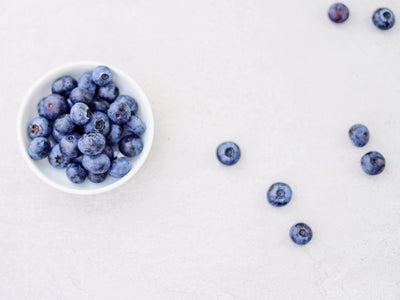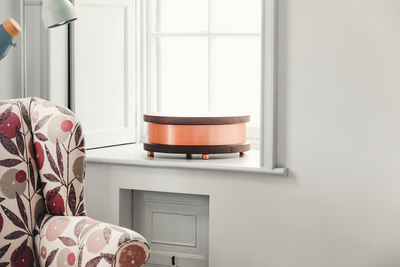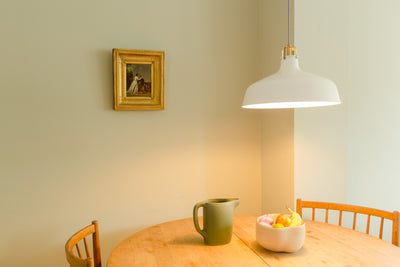Gut Feeling: How the Microbiome Affects Every Aspect of Wellbeing

“All disease begins in the gut”. So said Hippocrates, the ‘Father of Modern Medicine’ - and it seems he had a point.
“The gut microbiome is an absolutely vital part of healing, whatever ailment you have”, explains Conscious Spaces founder and qualified Nutritional Therapist, Tara Williams. “It informs your entire immune system and you simply cannot ignore it.”
Despite a growing awareness of the importance of gut health, confusion remains over the mysterious world of the microbiome. What is it made up of? How is it formed? What role does it play in our wellbeing - and can you do anything to give it a boost?
Addressing some of your most frequently asked questions, we’re delving into the darkest recesses of the human body to discover just what makes the microbiome so magnificent.
What exactly is the microbiome?
Living inside your body and on your skin (but mostly inside your gut), is an enormous invisible ecosystem of microbes, collectively known as the microbiome.[1]
For medical journalist Dr. Michael Mosley, the easiest way to understand the microbiome, is to think of it “as a small but incredibly complex rain forest. It throbs with life.”[2]
This idea of the microbiome as a symbiotic natural environment is echoed by Mosley’s fellow science journalist and microbe expert, Ed Yong. According to Yong, every one of us is a “zoo in our own right - a colony enclosed within a single body. A multi-species collective.”[3]
But, if the inhabitants of this microscopic menagerie clearly aren’t anything like the monkeys and tigers of a real-life zoo or rainforest, what are they? “The vast majority of them are bacteria” says Yong, “but there are also other tiny organisms including fungi (such as yeasts). There are viruses too, in unfathomable numbers.”[4]
The diversity of life contained in our microbiome - trillions of different species - is, in fact, even greater than that you would find in a rain forest.
“We have 40,000 species of bacteria that could be interacting in some way with the body”, says Dr. Zach Bush M.D. “There are probably >5 million species of fungi. There are 1031 viruses on the Earth. There are 10 million times more viruses than there are stars in the entire universe. This means that the amount of microbiome that is in daily contact with the body is staggering in size - we just cannot truly understand the sheer biodiversity and density of microbiome.”[5]
So, even when we feel alone, it seems we’re never truly alone. Our very own living multitude of microbes is always there with us - eating when we eat, travelling when we travel. And when we die? “When we die”, says Yong, “they consume us.”[6]
What does the microbiome do and how does it affect health?

Until relatively recently, very little was understood about the role the microbiome played.
“We used to think their [microbes’] job was pretty basic”, says Mosley. “To protect our gut from invaders; to synthesize a few vitamins like Vitamin K, which the body doesn’t produce itself; and to produce nasty smells while gobbling up the fiber that our bodies can’t digest. Now we know they do far more than that.”[7]
Triggered by the genetic revolution (in which scientists were able to sequence genes and find traces of bacteria by looking for fragments of their DNA) a tidal wave of new research has helped to unveil the world within our intestines - expanding our understanding of how our bodies work.
Studies have shown that the microbes in our gut can:
-
Have a huge impact on mental health, brain function and behaviour
The brain-gut connection is one that has received increasing attention in recent years,[8] with research revealing how the gut is directly linked to the brain by a special neuron circuit.[9]
We now know that a ‘second brain’ lies buried deep inside our intestines. This second brain in the gut is, fascinatingly, about the same size as the brain of a cat - an animal much-admired for its independence and agility.[10] Except that instead of being combined in one big brain mass, the gut brain is spread out all along the passage from throat to rectum.
This second brain communicates with the brain in your head via the vagus nerve - continually sending messages in both directions, like a busy phone line.
There’s also, says Mosley, “plenty of evidence that your microbes can hack into this system and talk directly to your brain via the vagus nerve. They also produce a range of hormones and neurotransmitters that reach your brain via your blood stream.” [11]
By producing a variety of mood-affecting chemicals and hormones (such as dopamine, our ‘feel-good’ hormone, or serotonin, the ‘happy’ chemical), our microbiome has the capacity to make us feel joyful or dejected, calm or stressed - and can make us more or less susceptible to disorders like anxiety and depression.[12] Equally, when we experience stress of any kind - sleeplessness, worry, trauma - that can, in turn, affect and alter our microbiome; leaving it imbalanced and more vulnerable to external threats.[13]
“We’re starting to realise that 90% of serotonin that is produced in your body - serotonin being a neurotransmitter that modulates everything from mood to focus to creative capacity - 90% of that neurochemical is produced in the gut lining rather than in the brain itself”, says Dr. Zach Bush M.D.[14]
Backing-up the idea that the balance of bacteria in the gut can impact mental health, a 2011 study showed how feeding mice Lactobacillus (a probiotic, or ‘beneficial bacteria’ found in fermented foods and yoghurt), significantly reduced symptoms of anxiety and depression.[15]
-
Shape, instruct and control our entire immune system
Our microbiome has a huge impact on our immune system and vice versa, with the relationship between microbes and the immune system described by scientists as “highly coevolved”.[16] Additional studies have shown how our microbes are responsible for both activating and suppressing inflammatory responses as needed, helping to keep our body in balance and protecting it from harm.[17]
-
Regulate body weight and fat storage
The bacteria in our gut have a lot to answer for when it comes to weight. Evidence indicates they can influence the way we store fat, control the number of calories we take in, dictate the amount of nutrients we extract from our food, and affect the rise and fall of blood sugar levels. [18] Studies have even shown how our microbiome could make us more likely to become obese.
In 2005, research proved that the microbes inside the gut of an overweight individual could be significantly different to those found in the gut of a slim person.[19] The research showed that obese people (and mice) have a whopping 50% less Bacteroidetes (a type of bacteria associated with a lean body type, a healthy immune response and less inflammation in the gut) and increased levels of Fimicutes (a type of bacteria associated with a higher risk of obesity and a diet high in fat and sugar) than their slimmer counterparts.
Then, in 2006, experiments were conducted where microbes were taken from both obese and lean mice and transplanted into microbe-free rodents.[20] Those that received microbes from lean donors put on 27% more fat, while those with obese donors piled on 47% more fat. Scientists had effectively transferred obesity from one animal to another, just be moving their microbes across - showing that the guts of obese individuals contain altered microbiomes that don’t just contribute to - but could actually cause their excessive weight gain.
-
Help reduce your risk of allergies
Allergic diseases, intolerances and autoimmune conditions, where an overactive immune system responds to usually harmless things like pollen or gluten as if they were a serious threat, have dramatically increased in recent decades.
Now, research is pointing to the potentially central role of the microbiome in the reversal or treatment of conditions such as hayfever, asthma and IBS - suggesting that changing the mix of bacteria in your gut by taking “probiotics, prebiotics and/or synbiotics”, can reduce the harm these allergic diseases can inflict. [21]
-
Keep bones healthy
Recent studies show that the bacteria in our gut helps regulate bone mass and ‘remodel’ the skeleton (a process which happens throughout our lives, with bones subtly shifting in size, shape and position). Scientists have suggested that the microbiome could provide a new therapeutic target for osteoporosis and fracture prevention.[22]
But hang on a minute, I thought bacteria was bad?

Most of us think of bacteria as dirty germs to be avoided and destroyed.
“Microbes are now so commonly associated with dirt and disease”, says Yong, “that if you show someone the multitudes that live in their mouth, they will probably recoil with disgust.”[23]
We can trace this hostility towards microbes back to the mid-19th Century, when scientists began to realise that many of the most infamous plagues in history - from cholera to tuberculosis - were in fact caused by bacteria.
The famous French chemist Louis Pasteur (whose name lives on in ‘pasteurised’ product), was the first scientist to prove this causal link when, in 1865, he showed that conditions threatening to decimate France’s lucrative silk industry - were caused by eggs infected by microbes. Pasteur’s revelatory new idea was given a name: germ theory.
“Microbes had effectively been rediscovered, and were immediately cast as avatars of death. They were germs, pathogens, bringers of pestilence”, says Yong.[24]
This negative image continues to this day. Newspaper headlines scream of mobile phones covered in ‘more bacteria that a toilet seat’, whilst money, door handles, keyboards and gym equipment are coated in ‘disgusting germs’.
But, says Yong, this tarnished reputation is “deeply unfair”, because such a small minority of microbes are actually responsible for disease. In fact, the overwhelming majority are either benign or beneficial - and our relationship with them isn’t a one-way transaction, but rather a continuous cooperation. “Our bodies are continuously built and reshaped by the bacteria inside them”.[25]
So, whilst it might be tempting to reduce bacteria to ‘good’ and bad’, this would be to do our ‘old friends’ a disservice, ignoring their true, crucial - and reciprocal - role within our evolution, existence and wellbeing.
Where does your microbiome come from and how is it formed?

When you were growing inside your mother’s womb, you would have been ‘sterile’ - with a gut that was as-yet unpopulated by bacteria.
As soon as you entered the outside world, your body would have immediately and automatically started taking in bacteria, which would have quickly colonised your gut - thereby forming your own personal microbiome.
A ground-breaking new seven-year study shows, however, that babies born by caesarean have different gut bacteria to those delivered vaginally.[26]
Published last year, the research demonstrates that babies born vaginally acquire most of their initial dose of bacteria from their mother, while C-section babies are more likely to pick up microbes linked to hospital environments - including undesirable antimicrobial-resistant strains.
Because the gut microbiome is so intricately linked to health, it’s thought that these findings could help to explain the higher rates of allergies, asthma and other autoimmune conditions in babies born by caesarean. [27]
“How your immune system functions through your life might be influenced by its first interactions with bacteria,” said Nigel Field, a senior author on the paper from University College London.
The researchers were also surprised to discover that the microbiome of vaginally-delivered newborns wasn’t coming from the birth canal, but from their mother’s gut - presumably picked up at the moment of birth.
Reassuringly, by the time the babies were 6-9 months old, the differences between the two groups had largely disappeared. Experts were also keen to point out that, in many cases, a caesarean is a life-saving procedure and mothers who need or have had one should not be concerned.
Previous research has also shown that antibiotics (which are normally given to mums before a caesarean), also play a part in shaping the baby microbiome - as well as whether a baby is breastfed or not.
As one study put it, “common perinatal interventions like C-section, antibiotic use, and formula feeding alter the infant microbiome and may be major factors shaping a new microbiome landscape in human history”. [28]
Beyond birth, studies have revealed how exposure to microbes in early childhood can provide protection from immune-related diseases such as inflammatory bowel disease and asthma.[29]
“As we get older our biome changes and the number of species colonising our gut increases, up from about one hundred species in an infant to around one thousand in an adult”, explains Dr. Mosley. “By the time we are three years old, our biome will be largely settled, though it can still change in response to infection, antibiotic treatment, and changes in diet.”[30]
What makes a healthy microbiome?

“What constitutes a healthy gut microbiome will be different for different people”, explains Tara.
This is partly because no two microbiomes are identical. Each will have varying numbers of different types of resident bacteria - with levels constantly fluctuating depending on a range of factors, from what we eat, to the environment we live in and the amount of stress we experience.
Professor Tim Spector, a genetic epidemiologist fascinated by the microbiome and our individual responses to diet, is busy conducting the largest scientific nutrition research project focused on this very topic, called 'ZOE'. The project hopes to show that individual responses to food are unique, even between identical twins. You can sign up for early access to the project now, signaling your interest in taking a home test, discovering your unique responses to different foods, and resetting your microbiome with a personalised 4-week plan.
What is generally agreed upon by experts, however, is that you want your biome to be as diverse as possible.
Want to find out just how diverse your own microbiome is? Thanks to research projects like British Gut (again, directed by Prof. Spector), you can now get your microbiome sequenced - discovering which bacteria are thriving, and which you could do with more of, as well as comparing the microbes in your gut to those in guts of thousands of other people around the world.
Can you change/improve your microbiome?

“Our guts”, says Dr. Mosley, “like all ecosystems, aren’t defined just by the species within them, but also by the nutrients that flow through them.”[31]
So, whilst you might not be able to change the way you were born or whether your mother breastfed you, you can change the way you eat, how you exercise, relax and sleep, the type of environment you live in and the toxins you come into contact with and how you process them - all of which has the potential to reshape and change the mix of bacteria in your gut for the better.
In our next article, we'll be revealing exactly what to do to nourish your microbiome - and what to avoid to keep your gut health in balance.
References
[1] Ed Yong, I Contain Multitudes, p.2-3
[2] Dr. Michael Mosley, The Clever Gut Diet, p.51
[3] Ed Yong, I Contain Multitudes, p.3
[4] Ed Yong, I Contain Multitudes, p.2-3
[5] https://www.liebertpub.com/doi/10.1089/act.2019.29220.zbu
[6] Ed Yong, I Contain Multitudes, p.3
[7] Dr. Michael Mosley, The Clever Gut Diet, p.5
[8] https://pubmed.ncbi.nlm.nih.gov/26589226/
[9] https://www.sciencemag.org/news/2018/09/your-gut-directly-connected-your-brain-newly-discovered-neuron-circuit
[10] https://www.bbc.co.uk/news/health-18779997
[11] Dr. Michael Mosley, The Clever Gut Diet, p.87
[12] https://www.pnas.org/content/108/38/16050
[13] https://www.ncbi.nlm.nih.gov/pmc/articles/PMC1664925/
[14] https://neurohacker.com/gut-health-microbiome-dr-zach-bush-m-d
[15] https://pubmed.ncbi.nlm.nih.gov/22674334/
[16] https://www.pnas.org/content/108/38/16050
[17] https://www.ncbi.nlm.nih.gov/pmc/articles/PMC4056765/
[18] https://www.pnas.org/content/101/44/15718.full
[19] https://www.pnas.org/content/102/31/11070
[20] https://pubmed.ncbi.nlm.nih.gov/17183312/
[21] https://www.ncbi.nlm.nih.gov/pmc/articles/PMC6056614/
[22] https://www.sciencedirect.com/science/article/abs/pii/S104327601400201X
[23] Ed Yong, I Contain Multitudes, p.32
[24] Ed Yong, I Contain Multitudes, p.33
[25] Ed Yong, I Contain Multitudes, p.63
[26] https://www.nature.com/articles/s41586-019-1560-1.epdf
[27] https://www.newscientist.com/article/2216818-c-section-babies-have-a-different-microbiome-but-not-for-long/
[28] https://www.ncbi.nlm.nih.gov/pmc/articles/PMC4464665/
[29] https://science.sciencemag.org/content/336/6080/489.abstract
[30] Dr. Michael Mosley, The Clever Gut Diet, p.75
[31] Dr. Michael Mosley, The Clever Gut Diet, p.12


























